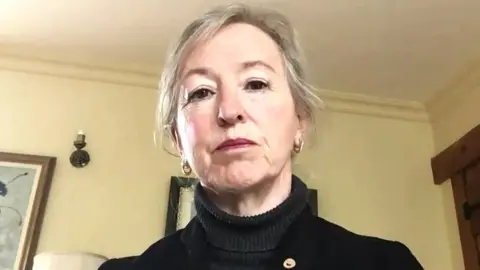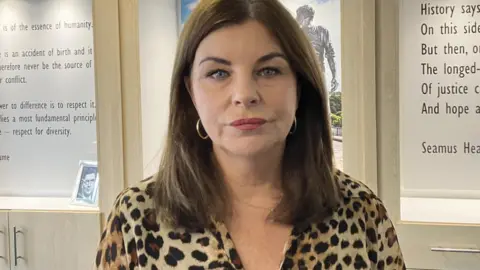NI public appointments commissioner: Hundreds of posts filled with no watchdog
 Neustockimages
NeustockimagesMore than 360 public appointments have been made in Northern Ireland without the oversight of an independent watchdog.
It has been nearly three years since a public appointments commissioner has been in post.
Former commissioner Judena Leslie said there is "no sensible explanation" for more delays in finding her successor.
The first and deputy first ministers' office said they will "shortly be considering plans for the way forward".
Northern Ireland has about 1,400 public appointments, ranging from unpaid boards of further education colleges to many high-profile paid positions.
The commissioner's role is to ensure that certain standards and principles are met in how these appointments to public bodies are made.
Ms Leslie's almost six-year term as public appointments commissioner ended in May 2021.
Since then, Stormont executive departments have made more than 360 public appointments or reappointments to roles that would normally fall under the scrutiny remit of the commissioner.
These appointments would attract annual salaries worth in total more than £2.2m.
The figures were obtained by BBC News NI through Freedom of Information (FOI) requests.

Ms Leslie said the commissioner role was important in the "regulation of how ministers go about making these public appointments".
"I simply don't see any sensible reason why there would continue to be a delay in appointing the commissioner," she said.
"And to fail to go ahead and make this straightforward appointment just adds to that sense of cynicism in our public systems, in our political systems."
She added: "There's nothing controversial or difficult about appointing a public appointments commissioner. So let's just get it done, and it will send out a good signal, a positive signal to the public."
Northern Ireland's power-sharing executive was restored in February after a two-year hiatus.
The commissioner role is jointly appointed by the first and deputy first ministers.
'Alarmingly lackadaisical'
Alliance Party assembly member Paula Bradshaw, chair of Stormont's Executive Office committee, expressed concern at the "marked lack of urgency" in appointing a new commissioner.
"The failure of the first minister and deputy first minister to have progressed the appointment of a commissioner for public appointments is yet another example of an alarmingly lackadaisical approach to getting on with urgent appointments across the Executive Office and elsewhere," she said.
Sinéad McLaughlin, also a member of the same committee, described as "troubling" the volume of public appointments made without a commissioner in post.
The Social Democratic and Labour Party (SDLP) assembly member said public "accountability and scrutiny" were being "undermined".
"Prior to the last assembly election, the first and deputy first minister failed to fill this position and the collapse of the institutions over the last two years further frustrated efforts to appoint this important role," she said.
"We need to see the appointment of a new commissioner by the Executive Office without any further delays or excuses."

The commissioner's office said appointments to public bodies should be made "on merit, in a fair and transparent manner" and the commissioner role would "regulate, monitor, report and advise on the way in which these appointments are made".
It said in the absence of a commissioner, the office has maintained an "open-door policy for departments and others seeking advice and guidance on public appointments".
It added that a code of practice published by the previous commissioner is "still applicable and departments are expected to fully comply with this".
In a statement, an Executive Office spokesman said: "The Commissioner for Public Appointments for NI (CPANI) is appointed by the first minister and deputy first minister acting jointly.
"Following the return of the executive, ministers will shortly be considering plans for the way forward regarding filling the post.
"Since the previous commissioner stepped down from her role, the day to day business of CPANI's office has continued including the provision of advice and guidance, however, this has not extended to the statutory regulatory duties of the post, which only a commissioner can undertake.
"Public appointments have continued to be made in the intervening period and the CPANI code of practice continues to apply."
